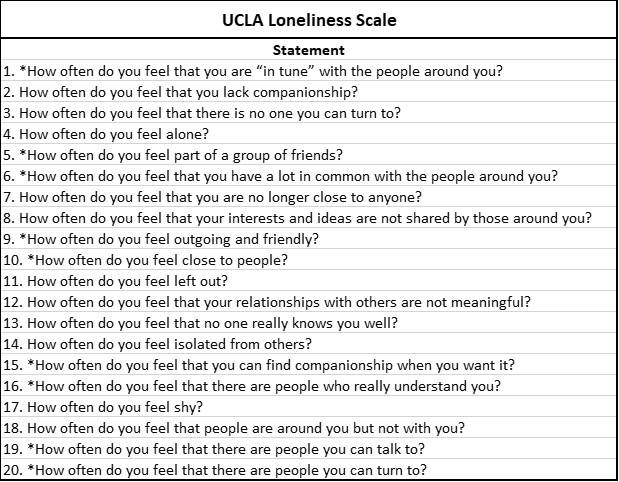Loneliness
Sep 25, 2023I know loneliness well.
In 2010, my wife told me to move out of the house.
The family house was a happy one, for the most part. It was a busy place with our four kids, a loud and merry home, beautiful suburb of Boston, four seasons per year, two warm fireplaces, yellow lab dog, music, food, and lots of hugs. Coming home to people who love you is a beautiful thing. I never felt lonely.
As one of four boys, I grew up in a similar environment in California. Big, noisy, happy house. But we didn’t hug. We were boys. I loved being with my brothers. Beaches, fishing, water skiing, hunting, football, parties, girls. Oh man, it was so much fun. I never felt lonely.
Obediently, I did as I was told and moved out of the family house. The apartment I moved to was small, dark, cold, and sad. It sat between the back of the grocery store and the busy expressway. I was alone and numb. How on earth did I get here? I felt like a loser. Lonely loser. What did I do wrong? What did she do wrong? What will this do to our children? We got divorced after I moved out. Guilt, anger, resentment, fear, regret, I’ve experienced them all. And for the first time ever, I was lonely.
Guys don’t talk about Loneliness
I know a lot of guys who are lonely. But I know very few who would admit it, let alone talk about it.
Why don’t men talk about loneliness? Many reasons:
- Fear of appearing weak – Seriously dude, “Man up,” “Don't be a wimp,” and remember, “Boys don’t cry.” Don’t let anyone know you're feeling down. People will think you’re weak if you do. Since an early age, us guys have been conditioned to equate emotional openness with weakness.
- Fear of judgement – Admitting to loneliness makes a man feel less attractive, less competent; his worth is tied to his social prowess and ability to engage with others. And, to protect his self-image, he wouldn’t even admit it to himself.
- Internalizing the shame – Men have been trained to internalize their emotions rather than express them. Honestly, I can’t remember ever hearing a guy tell me he’s lonely. The “manly” thing to do is to deal with it internally, which of course means not dealing with it at all. Heck, let's have another drink.
- Men are competitive – Our social circles emphasize competition over emotional support, even as we age. Whether it’s about career accomplishments, financial status, worldly travels, or muscle strength, it’s about one-upmanship. Don’t show them your loneliness and weakness if you want to win.
- Loss of social circles – Retirement, loss of a partner, friends move away or die, or we move to a different city; all these can increase isolation and make it harder to reach out to a friend who will really listen.
- Limited emotional tools – Men often don’t know how to deal with it. They lack the language to articulate these complex feelings and emotions. The average 50-year-old man has spent roughly 60,000 hours of his life working, and likely not any time learning how to cope with loneliness, or other emotions for that matter.
What is loneliness?
I’m not a social scientist but for sure I'm an expert on how loneliness feels.
"Social embeddedness" (the opposite of loneliness) in family and communities is central to Well-Being and quality of life. We need to feel embedded in social circles to feel good. We are social creatures.
Loneliness is a subjective and negative experience. We all have different loneliness thresholds. What makes you feel lonely may not make me feel lonely, and vice versa.
Loneliness is experienced when you feel there is a gap between the quantity and quality of your existing relationships and your relationship standards. How lonely someone feels depends on their relationship standards.
For example, the degree to which widowed adults experience loneliness depends on their “partner standard;” the more importance placed on having a partner, the more lonely the widowed feels.
There are two types of Loneliness:
1. Emotional loneliness – Missing an intimate relationship (partner, best friend). For example, a partner relationship dissolves through divorce or being widowed.
2. Social loneliness – Missing a wider social network (friends, neighbors, family, close co-workers). For example, people move to a place where they are newcomers.
When I moved out of the family house, I felt both types of loneliness. I had feelings of emptiness, hollowness, darkness, and anxiety.
How do you measure loneliness?
There are surveys available to asses levels of loneliness.
The UCLA Loneliness Scale:
The UCLA Loneliness Scale is a commonly-used measure of loneliness. It was originally released in 1978 as a 20 - question survey. It has since been revised several times. There are also shorter versions available for situations like telephone surveys.
Learn more here:
Wikipedia: UCLA Loneliness Scale
Stanford University: SPARQ Tools (UCLA Loneliness Scale)
Take the UCLA Loneliness Scale online Take the survey here
To download the UCLA Loneliness Scale template (Excel doc) click here, then click on the Resources button. You can use this to calculate your loneliness score or share it with others.
The De Jong Gierveld Loneliness Scale
This tool measures the feelings of missing an intimate relationship (emotional loneliness) and missing a wider social network (social loneliness).
To learn about Jenny De Jong Gierveld, see this link here.
See the survey: The De Jong Gierveld Loneliness Scale.
See the Brief Guide to Measuring Loneliness: here
Here are the questions from the UCLA Loneliness Scale:

Loneliness can kill you
Loneliness and social isolation have been rising for years. At the same time, we have never been more connected digitally.
Loneliness has detrimental consequences on our physical, mental, and emotional Well-Being, especially among older adults.
In his book, Keep Sharp, Dr. Sanjay Gupta provides a lot of data on the negative effects of loneliness. The excellent notes section of the book is filled with references to many sources of research and surveys. Here are a few of the points he mentions:
- One third of Americans older than 65, and half of those over 85, are now living alone.
- Adults who say they are happy with their friends and social activities were more likely to report an increase in their memory and thinking skills.
- Those who were unsatisfied with their social lives report their cognitive abilities had declined.
A Global Council on Brain Health survey of adults over 40 found:
o 37% said they lacked companionship
o 35% found it hard to engage socially
o 30% said they felt isolated
People with fewer social connections have:
o Disrupted sleep patterns
o Altered immune systems
o More inflammation
o Higher levels of stress hormones
o Increase risk of heart disease by 29%
o Increase risk of stroke by 32%
There is a lot more data in Dr. Gupta’s book with plenty of references to papers and articles on the subject of loneliness and social connections.
Symptoms of Loneliness
- Emotional symptoms – Anxiety, depression, sadness and other feelings that are hard to shake off.
- Physical symptoms – weight gain, sleep problems, elevated blood pressure and heart rate.
- Behavioral changes – Ignoring phone calls, canceling social commitments, quitting activities you once enjoyed.
- Depth of relationships – Having superficial conversations devoid of meaningful emotional exchange.
- Busyness – Confusing busy activities at work or home with close social interaction; keeping busy to avoid facing loneliness.
Reasons for Loneliness
- Loss of a partner – Death or divorce often creates a spiral into loneliness.
- Evolving social circles – As we age, people in our social circles may leave or pass away causing a void in our social circles.
- Moving away – We may move away or our friends may move away, causing changes to our social structures.
- Empty nest syndrome – When the kids move out of the house, there’s an emptiness that’s hard to fill.
- Workplace changes – For many people, the workplace is their primary social circle. Job losses, retirement, reorganizations can disrupt the workplace.
- Reduced mobility – We take for granted a lot of things. Walking for one. Watching family and friends drop out of social gatherings because of loss of mobility is a reminder that could eventually be us.
Remedies for Loneliness
Coping with loneliness is not easy. It requires some vulnerability and getting off the couch for your own benefit. Here are ways to confront loneliness:
- Courage. Build the courage to talk to people close to you about your loneliness; you’ll find out plenty of others can relate and would also like to talk about it.
- Implement the Nine Pillars of Well-Being. Each of the Nine Pillars can hit loneliness from different angles.
- Go to the gym. Pump iron. The exercise and social environment will kickstart “happy hormones” (Dopamine, Serotonin, Endorphins). Sometimes, during my episode of loneliness, I would go to the gym just to smile and say hello to people. Since I'm a regular there's almost always someone I know there.
- Get outside. Go where there are people. Also, get out in the sun to increase serotonin production. Put the phone down and go. Simply moving your body will make you feel better.
- Do Mindfulness work. Yoga, breathwork, meditation. I know guys, admitting loneliness AND doing yoga are like way out there on the “that’s not for me spectrum.” But every time I do yoga, every part of me feels better; mental, physical, etc. And when I say yoga, I mean like real yoga in a real yoga studio, with an experienced, trained yoga teacher. I know that can sound frightening, but if I can do it, you can do it.
- Call your friends. Do it now. Ask them how they are doing. Reach out to friends who you think might be lonely. They will feel better and helping them will make you feel better.
- Awareness. Being aware that every person on this planet has something they are dealing with or suffering from. Loneliness is one of those that is often swept under the rug.
- Lonely versus being alone. Appreciate the difference between being lonely and being alone. I love my alone time, but feeling lonely hurts.
- Laughter and fun. Our moods are improved with laughter. Watch a comedy with a friend or loved one, share a funny video, go to a game. A few good belly laughs can trigger “happy hormones.”
Thankfully, it's been years since my episode of loneliness. I've gained a lot of wisdom since those days and there's no doubt in my mind that we can find meaning in our suffering and find meaning in our loneliness. I am a better man today after going through that episode in life. I hope this newsletter can be helpful to anyone who experiences loneliness.
Thank you for reading!
Be well,
Peter Pavlina
Here's a picture of the barbers at my barber shop here in South Beach (Miami Beach). I got a haircut the other day as I started writing this newsletter. A place as simple as a welcoming barber shop can help alleviate feelings of loneliness. These guys are awesome.



